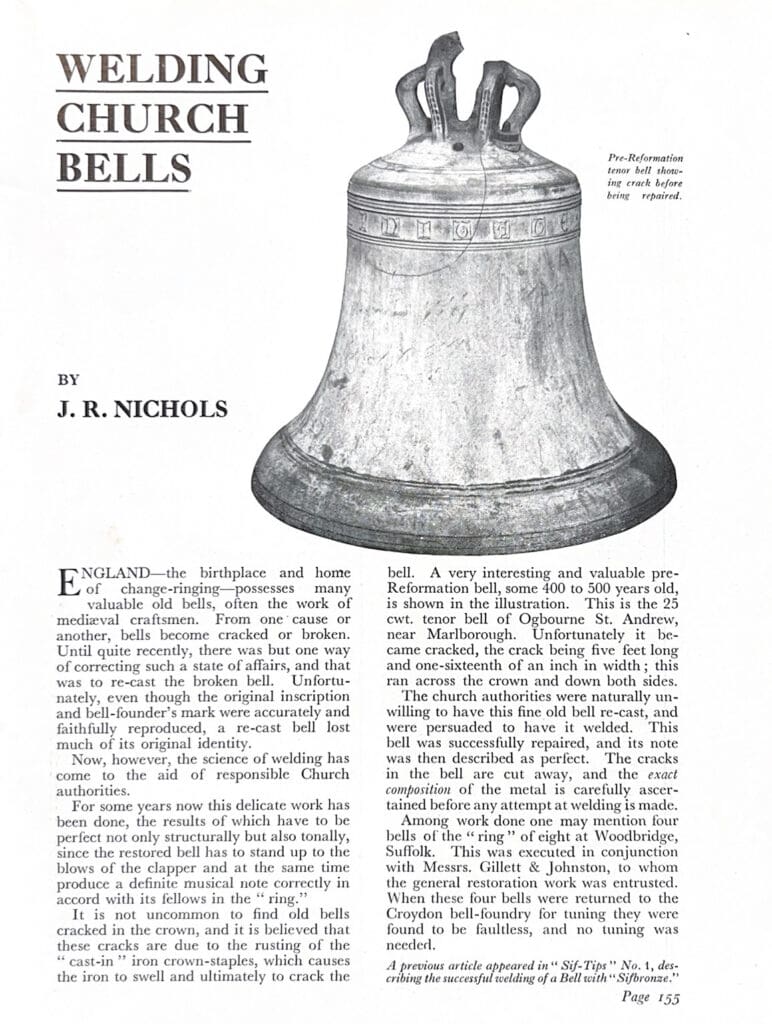Introduction
England, the land where the art of change-ringing was born, is home to many historic and valuable church bells. These bells, often masterpieces of medieval craftsmanship, hold a significant place in the nation’s heritage. However, the passage of time and the relentless toll of nature occasionally result in cracks and breaks that threaten to silence these historical treasures. This is the story of how modern welding techniques, guided by the expertise of Suffolk Iron Foundry (SIF), have breathed new life into these ancient bells, preserving their unique identities and sounds for future generations.
The Traditional Dilemma
For centuries, the only solution for a cracked bell was to re-cast it. This process, though effective in restoring functionality, often stripped the bell of its original character. The inscriptions, founder’s marks, and the unique tonal qualities forged over hundreds of years were lost, replaced by something that, while new, lacked the historical essence of the original.
The Advent of Welding
Enter the innovative field of welding, which offered a groundbreaking alternative. The science of welding not only allowed for the structural repair of the bells but also preserved their original tonal integrity. This technique required meticulous precision, as the restored bell needed to withstand the constant strikes of the clapper and produce a harmonious note in perfect alignment with its peers in the “ring.”

A Landmark Restoration: The Ogbourne St. Andrew Bell
One of the most remarkable examples of this technique in action was the restoration of the 25 cwt. tenor bell of Ogbourne St. Andrew, near Marlborough. This pre-Reformation bell, dating back 400 to 500 years, had developed a severe crack five feet long and one-sixteenth of an inch wide. The crack ran across the crown and down both sides, rendering the bell unusable.
The church authorities, recognizing the historical value of this bell, were understandably reluctant to re-cast it. Instead, they opted for welding. This complex process involved cutting away the damaged sections and carefully analyzing the metal composition before proceeding with the repair. The result was nothing short of miraculous—the bell was restored to perfect tonal quality, maintaining its historical and acoustic authenticity.
The Suffolk Connection
The successful restoration of the Ogbourne St. Andrew bell was not an isolated incident. Suffolk Iron Foundry (SIF), renowned for its expertise in welding technologies, played a crucial role in supporting these intricate restorations. The use of SIF’s advanced welding products ensured that each repair was both structurally sound and tonally accurate. This collaboration highlighted the seamless integration of traditional craftsmanship and modern technology.
The Woodbridge Bells
Another significant project involved the restoration of four bells from the “ring” of eight at Woodbridge, Suffolk. This project, executed in conjunction with Messrs. Gillett & Johnston, showcased the meticulous care and precision required in bell restoration. Once the welding was completed, the bells were sent to the Croydon bell-foundry for tuning. Remarkably, they were found to be faultless, requiring no additional tuning—a testament to the high standards achieved through this innovative approach.
Conclusion
The restoration of England’s historic bells through welding is a fascinating intersection of heritage preservation and modern engineering. The meticulous work performed on the Ogbourne St. Andrew and Woodbridge bells demonstrates how ancient traditions can be safeguarded using contemporary techniques. Suffolk Iron Foundry’s role in these restorations underscores the importance of skilled craftsmanship and advanced technology in preserving our cultural legacy.
These case studies not only celebrate the revival of the bells themselves but also the dedication and ingenuity of those involved in their restoration. Through the combined efforts of historical knowledge and modern expertise, the bells of England continue to ring out, their voices resonating with the rich history they embody.
